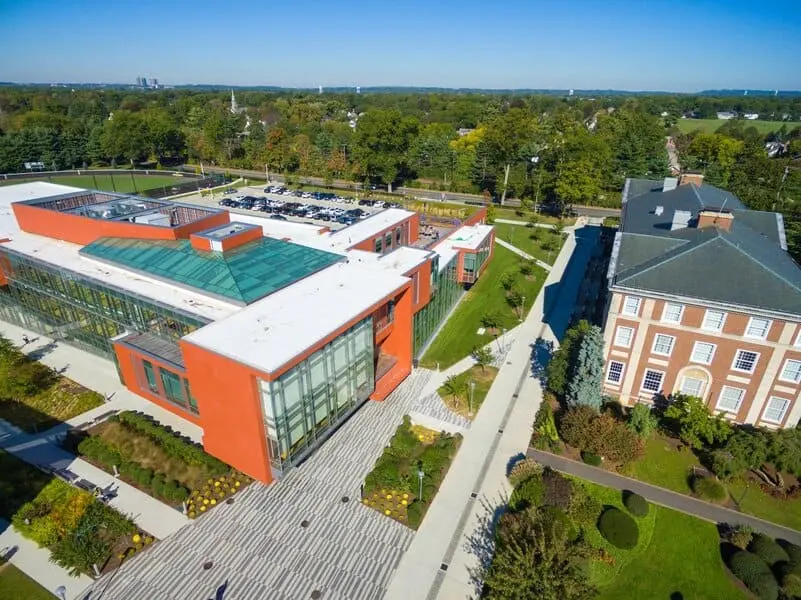If it’s not the USA or the UK then it is definitely Canada for anyone looking to study aboard (making it the 4th biggest and hottest destination for higher education). Do you know what makes Canada this good? Is it the world-class universities, high-quality education, diverse culture, or their keen interest to invest more in tech, research, and development? What is it? Of course, they all are significant reasons individually influencing this hype; still, the major reason is that they are down humble in welcoming international students to study in their country and in great numbers (reaching over 300.000 in 2023).
Canada is one of those nations that go the extra mile in bettering its experience for its international students and are open to providing several work opportunities within its borders. As one of the most welcoming nations Canada does carry a lot of weight in making sure of its security. So, there is a strict process in place to confirm the genuineness of the applicants, their backgrounds, and much more. In this blog, we will learn the process and things you will have to be very particular about with the Canada visa application. The process will include getting familiar with the information on admission requirements, visa, immigration requirements, funding options, and much more. So, without further ado let’s get started.
Before we can get you to grips with the steps of how to apply for university in Canada here are some must-knows you should be familiar with
Standardized Test Score for Admission to Canada
Demonstration of standardized test scores is a must for admission in Canada. You’ll need to submit course-specific test scores for admission to many graduate programs. Below, we have mentioned some of the renewed exams that Canada mandates you to achieve before applying to any of its institutions.
| Program Type | Test | Average Score Required |
| MS and related courses | GRE | 300-320 |
| MBA and other business courses | GMAT | 500-600 |
| MD | MCAT | 490-500 |
Canada’s Admission Requirements
Knowing the admission requirements is where you should first begin your journey to get admission in Canada universities. You can take professional support if you want to get more details on the same. However, it’s always advisable to do your research thoroughly on admission requirements for the program and institution you are interested in. These requirements may differ depending on the level of study, the program, and the institution.
1. Undergraduate Admissions
Here are some set undergraduate admission requirements to satisfy as an international student:
- You must complete secondary education equivalent to Canadian grade 12. So, completion of high school, A-levels, or an International Baccalaureate (IB) program should work.
- Letter of recommendation from a teacher or academic supervisor.
- Prove your proficiency in English. Read the table below for better clarification:
English Proficiency Requirements in Canada
The non-English students from across the world need to fulfill this requirement to get admission to the desired universities in Canada. Here, you’ll need to demonstrate your proficiency in English. One way to do it is to get good scores in competitive tests like IELTS, TOEFL, PTE, Duolingo, and a few other tests. The below table gives you information on some of the top universities in Canada and the minimum score you’ll need to get to achieve your approval letter.
| University | Minimum IELTS Score for UG Courses | Minimum IELTS Score for Graduate Courses |
| University of Toronto | 6.5 (6.0 per section) | 6.5 (6.0 per section) |
| McGill University | 6.5 (overall 6.0 per component) | Band score of 6.5 |
| University of British Columbia | 6.5 (6.0 per section) | 6.5 (6.0 per section) |
| University of Alberta 6.5 | 6.5 (6.0 per section) | (6.0 per section) |
| University of Ottawa | 6.5 band score | 6.5 band score |
| McMaster University | 6.5 (6.0 per section) | 6.5 with 5.5 per section |
| University of Montreal | – | 6.5 |
| University of Waterloo | 6.5 overallWriting and Speaking: 6.5 Reading and listening: 6.0 | 7.0 (6.5 per section) |
| Western University | 6.5 | 6.5 |
| University of Calgary | 6.5 | 6.5 (6.0 per section) |
| Queen’s University | 6.0 (5.5 per component) | 6.5 (6.0 per section) |
| Simon Fraser University | 6.5 (6.0 per section) | 7.0 (6.5 per section) |
| Dalhousie University | 7.0 band score | 6.0 band score |
2. Graduate Admissions
Again, the admission requirements may differ depending on the program and the institution you opt for.
- You should have a 4-year bachelor’s degree or equivalent course with a 65%-86% aggregate
- It so happens that some programs may demand specific coursework or work experience from a specific industry
- You’ll need to have a good score of 6.5 or more in IELTS, GRE (mandated for top universities in Canada), and LORs
Study Permit Requirements
For security and purposes as an international student, you are instructed to fulfill these study permit requirements at all costs. Read below to learn more about what they are:
- You shall receive a letter of acceptance from a Canadian university that you apply to
- You should hold a legal passport and necessary travel documents with accurate information
- Get the proofs of financial documents like bank statements, scholarships approvals, etc
- Get a police certificate from the country of your origin
- Get your medical examination done from the country of origin
Immigration Options After Graduation
Now, this is one area that most students look out for. Once you have successfully finished your study in Canada you can apply for a permanent residency in the following ways:
- Canadian Experience Class
- Provincial Nominee Program
Get in touch with our study abroad expert here to dive into more details.
- These programs mandate you to meet set eligibility criteria like English language proficiency, certain work experience, and educational certifications
3. Funding Options
Studying abroad is a great experience that comes at a great price. We know, not all students can afford it. If you are one of them, don’t worry at all. Several universities in Canada offer scholarships and funding options to help you out. Here are a few options you should definitely know about.
a. Scholarships and Bursaries
Several institutions in Canada offer a range of scholarships and bursaries to international students. These are offered on certain conditions like academic merit, financial need, and in some instances a combination of both. It’s paramount that you research properly about the available scholarship opportunities in your desired universities. Additionally, some scholarships are specific to only a few programs or areas of study. We recommend you work with our expert to get a better understanding of the open options. Lastly, it is very important to apply early as the competition is massive.
b. Government Funding
As mentioned earlier Canada tries its best to give you everything you need to feel confident and comfortable while studying there. In the same process, the Canadian government provides funding to several international students as essential aid. Such fundings include International Scholarship Program and the Canada Student Loans Program. These programs help eligible students only (the eligible criteria include set criteria, including academic merit, and financial need).

Register With University HUB
Step 1 – Register With University HUB
Registering with University HUB is an excellent way to get expert direction on choosing the right university and course in Canada. University HUB networks with all the major educational institutions in the country, this is to say that our advisors are highly qualified to provide informed guidance to students globally.
Step 2 – Choose A University Or A Course
With so many amazing options to choose from it is highly likely that you may get confused. Well, you know, that’s fine! And this is how we help you, personalized guidance for each that analyzes the student’s academic background, career goals, and personal interests. We have this system in place where our advisors navigate through your core interests, strengths, and passions to help you find out what’s perfect for you.
Overall, we give special attention to each student like you to help make informed decisions that align well with your dreams and financial standing. Our expert guidance and personalized advice offered can make a huge impact on your university experience and future prospects.
Further, we guide you on a range of topics like the program requirements, how you should be prepared, admission criteria, scholarship opportunities, campus life, and much more.
Step 3 – Complete Personal Information
We’ll need you to document your personal details in a doc and keep it always handy with you. Personal information like:
- Full name
- Date of birth
- Contact information
- Work experience
- Educational background
- Residential address
- Family occupation and details
The data you provide and maintain in this document has to be the most accurate and up-to-date ones only. This document is a handy reference in several processes like job applications, visa applications, and background checks. Keep the doc very organized and clear to the point (so one doesn’t feel difficulty in reading it). Keep your document in a secure location, and share it only when necessary as the information is confidential.
OFFICIAL TRANSCRIPTS/CERTIFICATES
Official transcripts refer to the authorized documents/certificates issued by your university. These provide a detailed record of your academic performance including information such as:
- Course titles
- Grades/marks obtained
- The overall grade point average (GPA)
You can apply for the transcripts upon completing your graduation. Either you can apply online or directly from your university.
It is important to note that many universities require students to apply for official transcripts/certificates separately. And in most instances, there may be a fee for this service.
Cross-check if all the personal details mentioned on the certificates are accurate. Because these certificates are further required at every step of the way like immigration applications, job applications, or even higher studies. It is advisable to keep a copy of these certificates for personal records.
REFERENCE LETTERS
Reference letters, are recommendation letters precisely documents written by a person who knows you well and can testify to your abilities, character, and achievements. Especially, in college, teachers are often asked to provide reference letters for their students who are applying for jobs, internships, or further education aboard.
You can reach out to a teacher who you have a good relationship with and who you think has positive feedback for you. This letter can be about:
- Your academic performance
- Your resume and the specific opportunity you are applying for
- Your work ethic
- Your special talents or personal qualities
PERSONAL STATEMENT
Here you would need to outline and document your reasons for wanting to attend a specific university in Canada. This is your opportunity to showcase your aspirations and seize your chances to get approval. Well, many students often ask us what things to include about. we have answered here we go:
- Your personality
- Your interests
- Work experiences
- Explain why you are a fine fit for the program you are applying to
- How this program can help you achieve your career objectives
- Demonstrate your understanding of the program
UPDATED RESUME
An updated resume is a must. This document showcases:
- Your educational background
- Work experience
- Unique skills
- Achievements and certifications
These are vital when applying for jobs or higher education opportunities in Canada. Additionally, you need to ensure that your resume meets Canadian standards.
What formatting and content requirements does this include?
- Contact information
- A professional summary
- Listing your work experience in reverse chronological order
You can consult our experts on this as it is such a crucial step and requires the utmost attention to generate the best resume. A perfect resume can help you stand out to Canadian universities and employers (if you plan to apply for jobs in Canada).
ENGLISH PROFICIENCY SCORES
English proficiency scores are mandatory for all non-native speakers of English. These scores that you attend and submit serve as a document that demonstrates your level of proficiency and can significantly impact your admission approval.
The scores, such as IELTS 6.0 Overall, TOEFL, or Duolingo, verify your ability to communicate effectively in English. And this is where our expert advisors can help you determine which English proficiency test is best suited for you based on your academic background and goals. We also provide guidance on test preparation and resources to help you improve your English language skills.
CURRENT PASSPORT
A current passport of yours is a quintessential document when you are traveling internationally.
- You need to keep this document up-to-date and with the most accurate information.
- It is mandatory that your passport has a minimum of six months’ validity from the date of entry into the new country when applying for a visa.
- In case your passport is nearing the expiry date, it’s recommended that you renew it before applying for a visa.
It’s obvious that this is a common requirement in many countries. This is meant to ensure that you have sufficient time to complete your trip without having to face any passport expiration issues. Our expert advisors can provide guidance on passport renewal procedures and requirements.
FINANCIAL PROOF
Note that It’s necessary to ensure that you have adequate financial resources to cover your expenses while studying in Canada, as this can impact your ability to obtain a study permit either way. So, financial proof is a must when applying for a study permit in Canada. It’s important to provide financial proof that confirms your ability to pay for your tuition, housing fees, living expenses, and return transportation.
Financial proof may include:
- Bank statements
- Income tax returns
- Sponsorship letters
Our expert advisors can provide guidance on the financial requirements for studying in Canada and help you navigate the application process smoothly.

TUITION AND HOUSING FEES
You’ll need to pay tuition and housing fees for the entire length of your stay in Canada and provide proof of it and only then you’ll be able to get the study permit. Tuition fee refers to academic program costs while housing fee is the accommodation cost (on campus or off campus).
Providing proof of payment for these fees is required to prove that you have adequate financial resources to support your studies and living expenses in Canada.
Note: You should pay these fees before applying for a study permit to avoid any delays or complications in the application process. Our expert advisors will better provide all the guidance on tuition and housing fees, as well as payment procedures and requirements.
LIVING EXPENSES
Many students who plan to study abroad are sure worried about living expenses due to the high cost of living. In Canada, it’s no different, so you’ll definitely need a plan. First, you’ll need to present proof that you have sufficient funds to cover your basic expenses. Here you can submit the form of a bank draft or sponsorship from your family and friends. Some of the basic living expenses you’ll need the plan funds for:
- House rent (on or off-campus)
- Food
- Transportation
- Health insurance
- Return ticket and miscellaneous
You must provide evidence of a return ticket to your homeland after completing your studies. This needs to be followed to assure that you have plans to leave the country at the end of your study period and will not stay illegally. All this is to help you plan your finances well in advance to avoid any complications during the visa application process.
EMERGENCY CONTACT DETAILS
You must inform emergency contact details and some relevant information about your friends, family, or relatives. This piece of information is utmost needed to contact them in case of any emergency. You’ll need to submit these details to the concerned authorities like your institution or the embassy.
They’ll be contacted in a state of emergency such as an accident, illness, or any other crisis that you may encounter.
Note: You can not provide any random details or information about people you don’t well know. These contacts must be the people who you trust and can assist you immediately when needed help in situations like providing medical information, arranging travel, or contacting other family members. Therefore, give only the up-to-date information and inform your emergency contacts of your whereabouts in Canada beforehand only. And in case they don’t want to be part of your emergency contact list you can find others in the meantime.
Step 4 – Application Fees
When applying to universities, you are required to pay a certain amount for the service as an application fee. The exact amount of the fee differs from one institution to another, but it typically falls between the range of $50 to $150.
Note: This fee is non-refundable and is mandatory to pay to process your application. This can be exempted by some universities by providing discounts or application fee waivers for certain students who demonstrate financial need (or are applying for certain programs).
We advise you to explore the options with our expert’s assistance. They’ll give you more insights into the application requirements of each university you are interested in and budget accordingly for the application fees. Nonetheless do make the payment before the application deadline to ensure that your application is considered.
Step 5 – Accept Your Offer
Once you submit your application successfully to your desired university you may receive one of these 2 offers:
Unconditional offer letter: It is when you have met all the admission requirements and indicate you proceed to the fee and get ready to join the university. And that is great news!
Conditional offer letter: It is when you haven’t met all the admission requirements and indicates you fulfill them first or make a deposit of your fee. Here are some conditional situations that are quite common:
- Achieving minimum percentage in your academics or high school
- Achieving minimum percentage in IELSTS
- Pay a minimum deposit of your course fees
If you receive a conditional offer letter as we mentioned and are not sure how to go about it. Don’t worry these can be fulfilled with the right guidance from our experts and so you can convert your conditional offer to an unconditional offer in no time.
Step 6 – Pay Your Fees
Once you receive an unconditional offer from the university, you will immediately need to pay either the full tuition fee or a small stake to secure your place in the program. Now, the amount of this deposit can differ depending on the university and the program you are enrolled in. Once you pay the fee, you will receive an unconditional acceptance letter from the university. This acceptance letter is sent to confirm your admission to the program.
It is highly advised to make the payment within the given deadline otherwise you’ll lose your spot in the program. Later, you can keep a record of this payment which is further required for the visa application process.
Step 7 – Apply For A VISA
After your acceptance letter and making the payment of your fee, you can begin the process of applying for a student visa to study in Canada. As the visa application process varies from one country to another and also depends on the type of visa you are applying for which you’ll need to provide the following documents:
- Your passport
- Proof of financial support
- Proof of enrolment in the university
- An authorized medical certificate
Step 8 – Get Ready To Start Your New Journey
In this step, you need big assistance in arranging your accommodation and travel plans to the university. With the University HUB expert support system you can find suitable accommodation, get a good understanding of local transportation systems, and settle well in your new environment.
This exciting phase can make you nervous but that won’t be the case can if you familiarize yourself with the culture and customs of the country. You’ll adjust better and we assure you that. Click Register now to get in touch with our experts and get started on your dreams soon 🙂
Here are People Also Ask (PAA) :
1. What are the essential steps to apply for universities in Canada?
Answer: Applying to Canadian universities involves several key steps:
- Research Programs and Universities: Identify institutions that offer courses aligning with your academic goals.
- Check Admission Requirements: Review prerequisites, including standardized test scores and language proficiency.
- Prepare Application Materials: Gather academic transcripts, letters of recommendation, and personal statements.
- Submit Applications: Complete and submit application forms along with required documents before deadlines.
- Pay Application Fees: Fees typically range from CAD 50 to CAD 150, varying by institution.
- Apply for a Study Permit: Upon acceptance, apply for a study permit to legally study in Canada.
- Plan Accommodation and Finances: Arrange housing and ensure sufficient funds to cover tuition and living expenses.
2. What documents are required for a Canadian university application?
Answer: Commonly required documents include:
- Academic Transcripts: Records from previous educational institutions.
- Language Proficiency Test Scores: IELTS or TOEFL scores for non-native English speakers.
- Standardized Test Scores: Such as GRE or GMAT, depending on program requirements.
- Letters of Recommendation: Typically from teachers or employers.
- Statement of Purpose: An essay outlining your academic and career objectives.
- Proof of Financial Support: Evidence of funds to cover tuition and living expenses.
- Valid Passport: Necessary for identification and visa purposes.
3. How important are standardized test scores for Canadian university admissions?
Answer: Standardized test scores are significant for Canadian university admissions, especially for graduate programs. Tests like the GRE or GMAT assess academic readiness and are often required, though some programs may waive this requirement based on other criteria.
4. When should I start the application process to study in Canada?
Answer: It’s advisable to begin the application process at least 12 to 18 months before your intended start date. This timeline allows for researching programs, preparing application materials, meeting deadlines, and securing a study permit.
5. Can international students work while studying in Canada?
Answer: Yes, international students with a valid study permit can work up to 20 hours per week during academic sessions and full-time during scheduled breaks without a separate work permit. This opportunity helps students gain work experience and manage living expenses.
For a comprehensive guide on the application process to study in Canada, visit University Hub.




